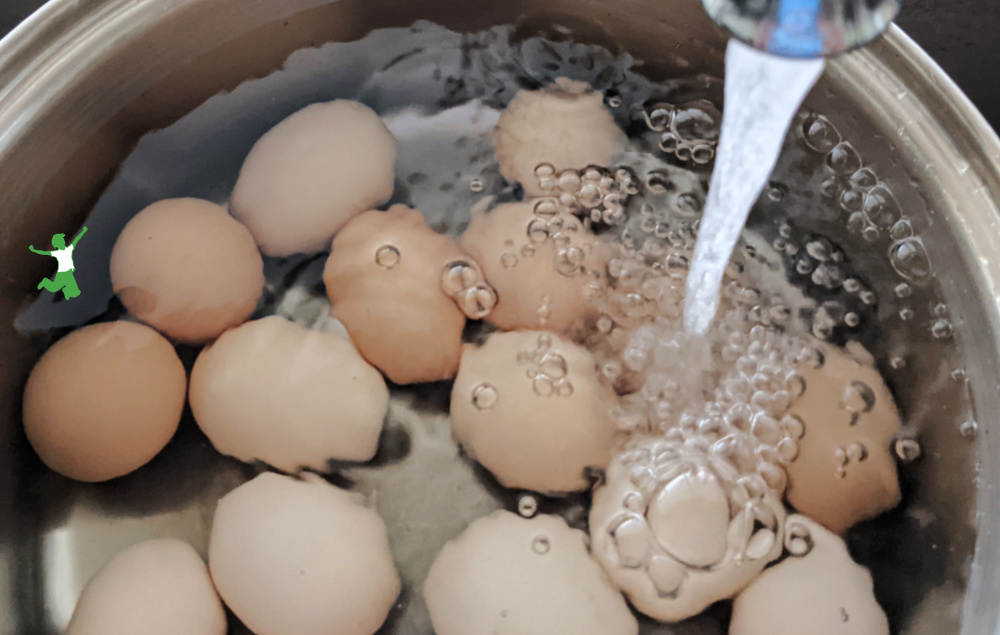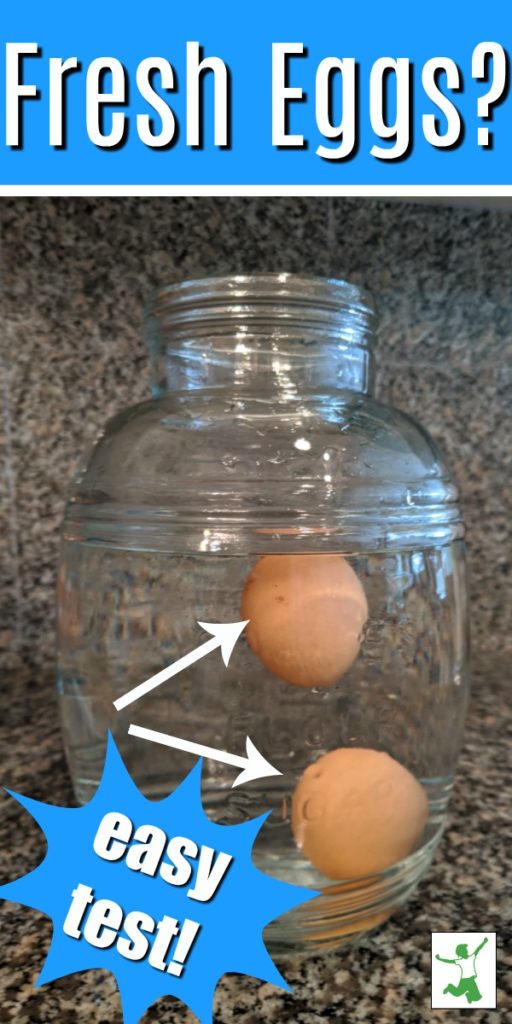Table of Contents[Hide][Show]
Quick and easy test using a glass of water to tell if you have fresh eggs, moderately fresh eggs, or old ones that should be thrown away.

Don’t you just love the way truly fresh eggs look in a bowl after you crack them? The yolks are so perfectly rounded and the whites whip up into the fluffiest meringue!
Fresh eggs go with the territory when you purchase from a local farm. Good quality, pastured chicken, goose, and duck eggs sell quickly enough that there isn’t any need for the tricks the egg industry uses to prolong egg freshness.
These questionable techniques include chemical-laced washing, partial freezing, and cold storage for weeks at a time before they hit your supermarket shelf.
These practices differ considerably from methods for preserving egg freshness at home!
Even if you buy organic eggs from Whole Foods or other health food stores, it is possible to get old eggs.
Old eggs not only don’t taste as good, in my opinion, but they also don’t poach nicely into that perfect egg shape that sits so pretty on top of a slice of sprouted toast or sourdough English muffin.
Do you suspect your fresh eggs might be less than really fresh?
If so, here are two clues that you need to find another egg source as suggested by Kenji Lopez-Alt, Chief Creative Officer of Serious Eats.
The Julian Date Tells the Tale
In the United States, every egg carton sold in a store is required to be stamped with a number between 000 and 365.
This number is the Julian Date and indicates the day of the year that the eggs were cleaned and packed into the carton.
A carton stamped with 000 means the eggs were packed on January 1 and a number of 213 means they were packed on August 2.
The bottom line is that you want a date as high as possible ideally only a few days to a week from the Julian date of the day you are purchasing the eggs.
Do not look at the date just to the right of the Julian Date as this is the expiration date of the eggs and could be up to six weeks after the eggs were packed!
For example, an egg carton stamped with the numbers 015 Feb 28 means that the eggs were packed on January 15 but the eggs can be sold until February 28 – a month and a half later!
Who wants six-week-old eggs that the store can legally sell as “fresh”?
Not me!
The Float Test for Fresh Eggs
The second way to test the freshness of your egg is to carefully place the egg in a cup of water.
To test multiple eggs at once as shown in the photo above, use a large pot.
- The freshest eggs will sink and remain flat lengthwise at the bottom of the cup.
- Semi-fresh eggs will stand up on one end and not lie flat at the bottom. They may also partially float in the water but remain fully submerged.
- Old eggs that should be tossed will float at the very top of the water.
In short, the older the egg, the more it floats.
The reason the float test works is because an air pocket in the fatty portion of the egg increases in size over time.
This air pocket is the cause of the increased floating action of older eggs in the water.
Blood Spot Eggs
Another way to spot a fresh egg is to shine a light through the shell. This is called “candling”. If you see that the egg yolk has a blood spot, this is an indication that the egg is quite fresh.
While blood spots are fairly common, they don’t happen often in commercial eggs because eggs with any defects are removed before packaging.
Thus, this test is only helpful if you obtain the eggs locally from a small farm or market.
Overall, the float test is the best option to test all your eggs regardless of where you purchased them.

Why Freshness Matters
As with any food, the fresher the better….for taste as well as nutrition.
Who wants eggs that have been semi-frozen and in cold storage for weeks before you even get them home just to increase shelf life?
Certainly, this is not a good option particularly if you are soft boiling the egg to feed your baby the warm, liquid yolk as a traditional first food!
Fresh eggs also separate better. A nice, perky yolk can be separated easily with your hands without a single drop mixing in with the white to ruin your macaroons!
Finally, fresh eggs are so much easier to poach. Fresh eggs have tighter whites as well as yolks that retain their shape better as they cook.
So if Eggs Benedict or another breakfast egg recipe is your thing, you will want to ensure that your eggs are as fresh as possible.
And, don’t forget. Nature’s perfect food is delicious later in the day too. Check out these ideas for lunch eggs or dinner recipes using eggs to get you started.
More Information
Why Organic Store Eggs are a Scam
What Oxidizes the Cholesterol in Eggs?
Best Egg Substitute (plus video how-to)








That’s so funny, my family was just talking about this at a gathering yesterday.
Thanks for the info! 🙂
Is your book available in any other format other than the kindle?
Thanks for the hard boiling tip, Sharon. Difficult peeling is one thing I’ve noticed since we starting buying eggs from our CSA…. but something I was willing to deal with to eat fresh eggs, though it seemed I was wasting a lot every time I peeled one. I’m going to go try your trick right now!
my mother always rolled her eggs to crack them all over for peeling. I’ve added a teaspoon, slipped under the membrane just below the shell. I can usually get the shell off in one strip that way, no pitting of the white, just a little rinse under the tap (which helps the salt stick better too!)
The last 20 years of my career as a home economist were spent as a food stylist. I often needed to by eggs for frying and/or hard-cooking. When it was critical I went directly to a chicken/egg farm near me. An employee told me that the age of the hen also had something to do with the perkiness (?) of the yolk and the tightness of the white. The older the hen, the looser the egg. I’ve never tried to confirm this with an academic but it sounds possible.
As a related tip, to prevent greening of the yolk after hard-cooking — plunge the freshly hard-cooked eggs into ice water to chill completely and remove the shells (even while they are chilling). I even cut them in half immediately to reduce the chemical interaction that produces the greening. I store the halves in a jar. ALL this is of course useless in the case of Easter Eggs!
Good info…. Older eggs are better to turn into Deviled Eggs… the air pocket makes it easier to peel. 🙂
Jill,
I have found that steamed eggs (steam for 10 minutes) peel much easier than hard boiled. So you may get your fresh eggs for Easter after all!
The salt trick/ice water immersion worked like a charm! Yay!!! Thanks again, Sharon!